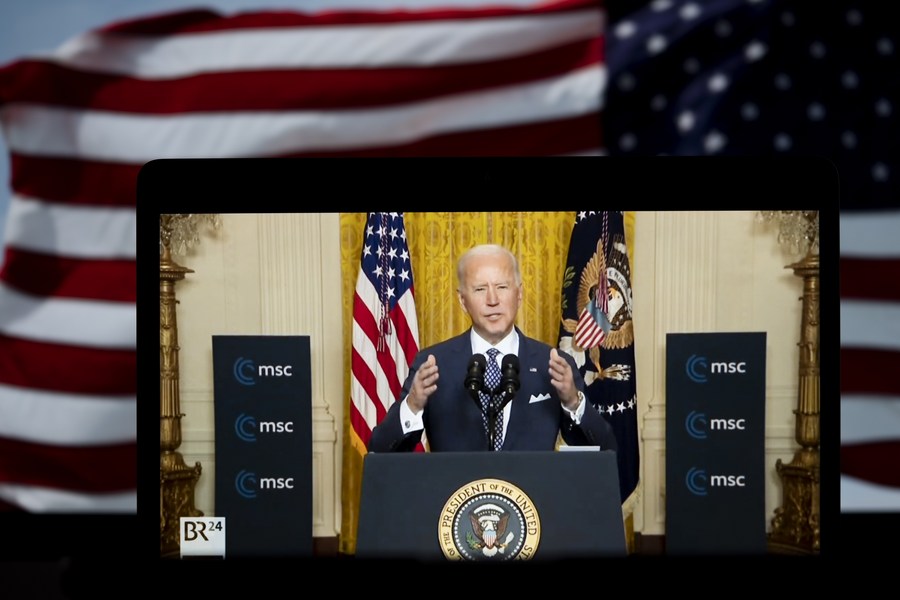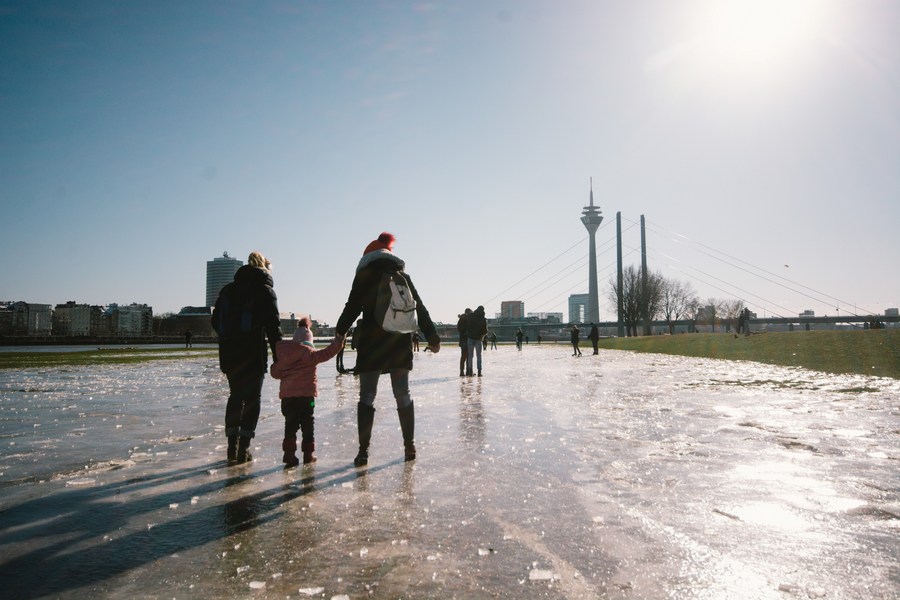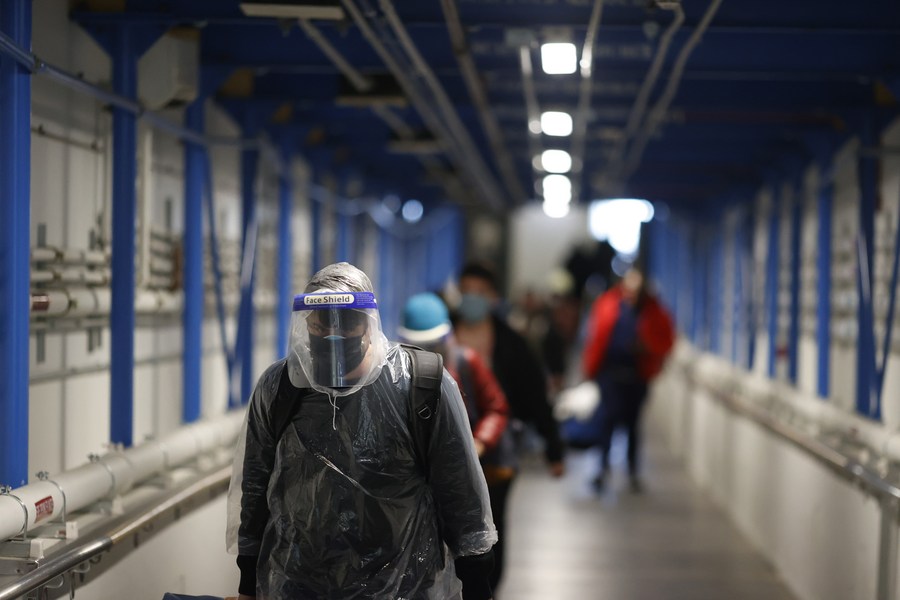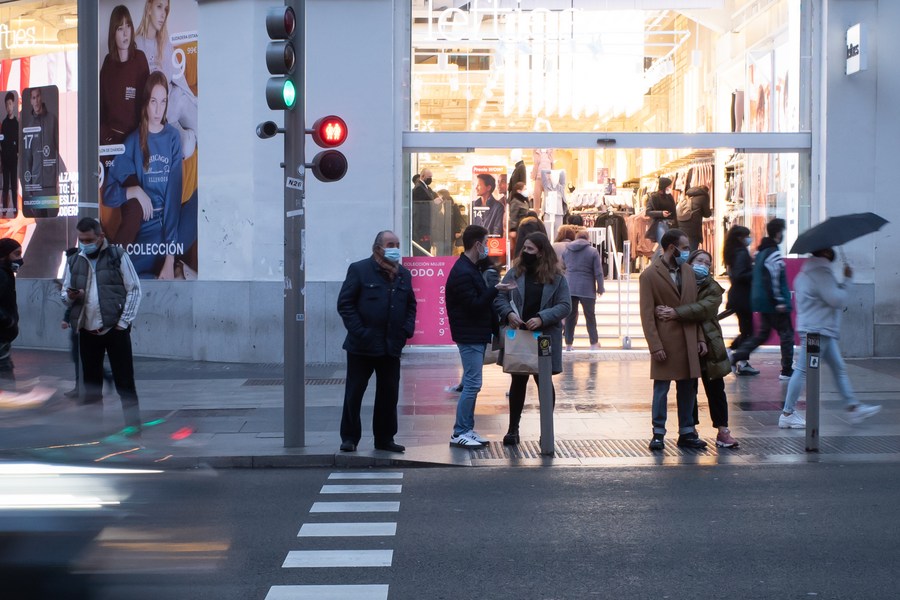
A staff member pastes a poster of the Munich Security Conference in Munich, Germany, on Feb. 15, 2019. (Xinhua/Lu Yang)
- "I'm sending a clear message to the world: America is back. The transatlantic alliance is back. And we are not looking backward," U.S. President Joe Biden said at the Special Edition of MSC 2021 on Friday. "I know the past few years have strained and tested the transatlantic relationship ... The United States is determined to re-engage with Europe."
- European Commission President Ursula von der Leyen said the U.S. commitment "could not come at a better time," citing climate change and digital initiatives as the two areas the two sides could strengthen common alliance.
BERLIN, Feb. 20 (Xinhua) -- Leaders from Europe and the United States on Friday sent a clear message of reviving transatlantic relations at a special virtual event of the annual Munich Security Conference (MSC).
Given that the impact of the COVID-19 pandemic and longer-term global challenges such as climate change have deepened the rifts between Europe and the United States, some leaders and experts called for a more effective and inclusive pattern of multilateralism that extends beyond the logic of the West and non-West.
CLEAR MESSAGE
"I'm sending a clear message to the world: America is back. The transatlantic alliance is back. And we are not looking backward," U.S. President Joe Biden said at the Special Edition of MSC 2021 on Friday.

Photo taken in Arlington, Virginia, the United States, on Feb. 19, 2021 shows a screen displaying U.S. President Joe Biden speaking in Washington, D.C. during a virtual event with the Munich Security Conference in a video provided by the U.S. State Department. (Xinhua/Liu Jie)
"I know the past few years have strained and tested the transatlantic relationship ... The United States is determined to re-engage with Europe," Biden said, referring to the worsened U.S.-Europe relations during the previous administration of President Donald Trump.
In response, European Commission President Ursula von der Leyen said the U.S. commitment "could not come at a better time," citing climate change and digital initiatives as the two areas the two sides could strengthen common alliance.
Jens Stoltenberg, secretary general of the North Atlantic Treaty Organization (NATO), said it is "a historic opportunity" for the United States and Europe to "regain trust" and "reinforce unity," calling for strengthening commitment to collective defense and contributing to fairer burden sharing.
The special meeting was convened just hours after Washington officially returned to the Paris Accord. In his address, Biden urged European allies to double down on commitments to fight climate change, warning of a "global existential crisis."
Von der Leyen called on the United States to rejoin "a timely message" in the run-up to the next United Nations Climate Change Conference, or COP26, to be held in Glasgow later this year, and commended Biden's initiative to host a Leaders' Climate Summit on Earth Day in April.
NEW REALITY
While European leaders welcomed Biden's comments and reaffirmed the foundation of the transatlantic alliance, some participants hinted at the new reality of different stances of Europe and the United States that has emerged over the past few years.

People enjoy themselves on a frozen bank of the Rhine river after rainfalls and low temperatures hit Dusseldorf, Germany, Feb. 13, 2021. (Photo by Tang Ying/Xinhua)
Noting that Germany stands for a "new chapter" in transatlantic relations, Chancellor Angela Merkel admitted that "our interests may not always converge," calling for multilateralism in tackling the pandemic, climate change and other security challenges.
"(The) world has moved on, Europe has moved on, and Germany has begun to realize that there are a number of areas in which our national interests do not coincide with those of U.S. foreign policy," Michael Schumann, board chairman of the German Federal Association for Economic Development and Foreign Trade, told Xinhua in an interview.
William Courtney, a retired U.S. ambassador and now an adjunct senior fellow of nonprofit global think tank RAND Corporation, said the Europeans will seek to build more resiliency into their relations with the United States, especially over defense and security issues.
French President Emmanuel Macron urged Europe to boost strategic autonomy within NATO and to decrease reliance on the United States. The "best possible involvement" of Europe within NATO is to be "more in charge of its own security and its strategic autonomy," he said on Friday.
The Europeans also urged the United States to join them in areas where Europe has taken a step ahead.

Photo taken in Munich, Germany, on Feb. 19, 2021 shows European Commission President Ursula von der Leyen (on the screen) addressing the virtual Munich Security Conference. (Marc Mueller/MSC/Handout via Xinhua)
Von der Leyen invited Washington to join the EU in regulating the "uncontrolled power" of big tech companies, and to "create a digital economy rulebook" together, though issues like digital service taxes have been clouding transatlantic ties.
Bertrand Badie, a professor emeritus at France's Sciences Po University and specialist on international relations, said transatlantic relations are in a situation of strategic vagueness which is likely to last.
In the opinion of Douglas H. Paal, a scholar with Carnegie Endowment for International Peace in Washington D.C., the accumulated mistakes of the past three decades concerning transatlantic relations will not disappear overnight.
INCLUSIVE MULTILATERALISM
Themed "Beyond Westlessness," this year's MSC attempts to break through last year's debate on "Westlessness" and build up the common standing of the West.
Schumann said he personally is not fond of talking about the abstractions of the West and the East. "This only hardens old prejudices, creates misunderstandings and hinders genuine rapprochement. We must break through these thought patterns of the past and build new bridges that connect us."

Travelers wearing face masks are seen at Ronald Reagan Washington National Airport in Arlington, Virginia, the United States, Feb. 2, 2021. (Photo by Ting Shen/Xinhua)
Leaders at the MSC event agreed that the past year has heightened the need for upholding multilateralism in the world hit especially by the pandemic.
UN Secretary-General Antonio Guterres called for strengthening multilateralism and making it more inclusive as global challenges are "getting bigger and more complex" whereas the responses worldwide remain "fragmented and insufficient."
In his view, a strengthened multilateralism should link global and regional organizations, economic and political entities; and an inclusive multilateralism should engage businesses, cities, universities and movements for gender equality, climate action and racial justice.
British Prime Minister Boris Johnson stressed the need to create an early warning system for the next pathogen, saying that Britain intends to work alongside the World Health Organization and other parties to make this happen.
Macron talked about an "effective, useful" multilateralism when addressing vaccine inequality. "If we want an effective multilateralism, our challenge now is to make it possible for all the countries in the world including emerging countries and poor countries to access vaccines," he said.

People wearing face masks wait to cross a street in Madrid, Spain, Feb. 8, 2021. (Xinhua/Meng Dingbo)
Global challenges like a global pandemic and climate change have made it clear that world leaders need to cooperate to find shared solutions, said Xulio Rios, director of the Observatory of Chinese Politics in Spain.
"Therefore, the idea of starting a new Cold War based on recycling past criteria would ignore the great challenges facing humanity in this century, which constitute the greatest of all urgencies," said Rios.
Rios said the EU has its own interests and strategies in dealing with international affairs and the bloc can make an important contribution to the peaceful transition towards an international order that accommodates more major countries, such as China. Enditem
(Xinhua reporter Matthew Rusling in Washington D.C. also contributed to the story.) ■




